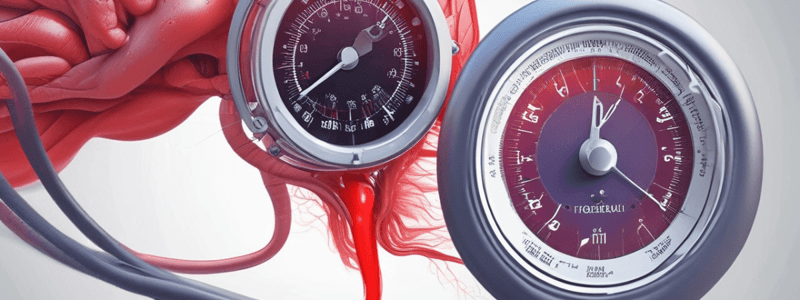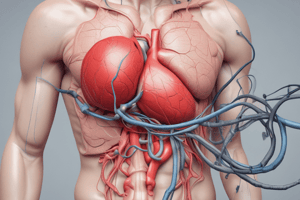Podcast
Questions and Answers
Which mechanism controls the arterial blood pressure by adjusting vascular capacity and resistance as well as blood volume?
Which mechanism controls the arterial blood pressure by adjusting vascular capacity and resistance as well as blood volume?
- Peripheral chemoreceptor reflexes (correct)
- Cushing's reflex
- Central nervous system ischemic response
- Efferent impulses to the SA node
Which hormone has potent diuretic and natriuretic effects on the kidneys?
Which hormone has potent diuretic and natriuretic effects on the kidneys?
- Vasopressin
- Atrial natriuretic peptide (ANP) (correct)
- Cortisol
- Thyroxine
Which reflex is activated by the reduction in partial pressure of oxygen (PaO2) and leads to vasoconstriction to increase blood pressure back to normal?
Which reflex is activated by the reduction in partial pressure of oxygen (PaO2) and leads to vasoconstriction to increase blood pressure back to normal?
- Central nervous system ischemic response
- Peripheral chemoreceptor reflexes (correct)
- Cushing's reflex
- Efferent impulses to the SA node
Which mechanism causes vasoconstriction to increase blood pressure back to normal proportional to the increase in intracranial pressure?
Which mechanism causes vasoconstriction to increase blood pressure back to normal proportional to the increase in intracranial pressure?
Which gland decreases the secretion of vasopressin (antidiuretic hormone) to increase urine output and decrease blood volume and pressure?
Which gland decreases the secretion of vasopressin (antidiuretic hormone) to increase urine output and decrease blood volume and pressure?
Which mechanism involves an increase in blood volume leading to increased capillary hydrostatic pressure and subsequent fluid filtration into tissue spaces?
Which mechanism involves an increase in blood volume leading to increased capillary hydrostatic pressure and subsequent fluid filtration into tissue spaces?
Which of the following hormones or hormone systems is involved in the hormonal regulation of arterial blood pressure?
Which of the following hormones or hormone systems is involved in the hormonal regulation of arterial blood pressure?
Which mechanism adjusts the body's fluid and blood volumes to control arterial blood pressure?
Which mechanism adjusts the body's fluid and blood volumes to control arterial blood pressure?
A decrease in arterial blood pressure leads to a reduction in which of the following, which subsequently decreases urine flow and salt excretion?
A decrease in arterial blood pressure leads to a reduction in which of the following, which subsequently decreases urine flow and salt excretion?
Which hormone is secreted in response to a decrease in arterial blood pressure and promotes sodium reabsorption by the kidneys?
Which hormone is secreted in response to a decrease in arterial blood pressure and promotes sodium reabsorption by the kidneys?
Which of the following is NOT a short-term mechanism for regulating arterial blood pressure?
Which of the following is NOT a short-term mechanism for regulating arterial blood pressure?
What is the primary function of the arterial baroreceptor reflexes?
What is the primary function of the arterial baroreceptor reflexes?
Which of the following statements about the capillary fluid shift mechanism is correct?
Which of the following statements about the capillary fluid shift mechanism is correct?
How does an increase in arterial blood pressure affect the glomerular filtration rate (GFR)?
How does an increase in arterial blood pressure affect the glomerular filtration rate (GFR)?
Which hormone plays a key role in the long-term regulation of arterial blood pressure by promoting sodium and water reabsorption in the kidneys?
Which hormone plays a key role in the long-term regulation of arterial blood pressure by promoting sodium and water reabsorption in the kidneys?
Which of the following is NOT a factor that determines peripheral resistance?
Which of the following is NOT a factor that determines peripheral resistance?
What is the primary mechanism by which adjusting arteriolar diameter affects arterial blood pressure?
What is the primary mechanism by which adjusting arteriolar diameter affects arterial blood pressure?
Which of the following statements about the relationship between cardiac output and blood pressure is TRUE?
Which of the following statements about the relationship between cardiac output and blood pressure is TRUE?
Which hormone is primarily responsible for regulating the glomerular filtration rate and, consequently, blood pressure?
Which hormone is primarily responsible for regulating the glomerular filtration rate and, consequently, blood pressure?
What is the primary mechanism by which aldosterone regulates blood pressure?
What is the primary mechanism by which aldosterone regulates blood pressure?
What is the primary cause of essential hypertension?
What is the primary cause of essential hypertension?
Which factor is NOT associated with the mechanisms of established hypertension?
Which factor is NOT associated with the mechanisms of established hypertension?
What is the effect of sustained diastolic pressures exceeding 90 mm Hg?
What is the effect of sustained diastolic pressures exceeding 90 mm Hg?
In patients with systolic pressures between 140 and 159 mm Hg, what must be considered when deciding on treatment?
In patients with systolic pressures between 140 and 159 mm Hg, what must be considered when deciding on treatment?
What is the basic mechanism for established hypertension?
What is the basic mechanism for established hypertension?
What is the most common cause of secondary hypertension related to increased activity of the renin-angiotensin system?
What is the most common cause of secondary hypertension related to increased activity of the renin-angiotensin system?
Which pathological consequence of raised arterial pressure is marked by homogeneous, pink hyaline thickening of arteriolar walls, leading to luminal narrowing?
Which pathological consequence of raised arterial pressure is marked by homogeneous, pink hyaline thickening of arteriolar walls, leading to luminal narrowing?
In the kidneys, the arteriolar narrowing caused by hyaline arteriosclerosis leads to what condition characterized by glomerular scarring?
In the kidneys, the arteriolar narrowing caused by hyaline arteriosclerosis leads to what condition characterized by glomerular scarring?
Which of the following conditions results in thickening of the media layer of muscular arteries due to smooth muscle hyperplasia and collagen deposition?
Which of the following conditions results in thickening of the media layer of muscular arteries due to smooth muscle hyperplasia and collagen deposition?
What selective response to hypertension includes thickening of the media layer of muscular arteries and collagen deposition in small arteries and arterioles?
What selective response to hypertension includes thickening of the media layer of muscular arteries and collagen deposition in small arteries and arterioles?
What is the pathological consequence of long-standing systemic hypertensive heart disease leading to congestive failure?
What is the pathological consequence of long-standing systemic hypertensive heart disease leading to congestive failure?
Which condition is characterized by marked concentric thickening of the left ventricular wall causing a reduction in lumen size?
Which condition is characterized by marked concentric thickening of the left ventricular wall causing a reduction in lumen size?
What may be the heart weight in individuals with long-standing systemic hypertensive heart disease?
What may be the heart weight in individuals with long-standing systemic hypertensive heart disease?
What is the major effect of increased left ventricular wall thickness in systemic hypertensive heart disease?
What is the major effect of increased left ventricular wall thickness in systemic hypertensive heart disease?
What is the primary pathological feature of chronic cor pulmonale?
What is the primary pathological feature of chronic cor pulmonale?
Which pathological change is described as exhibiting 'onion skin', concentric, laminated thickening of arteriolar walls and luminal narrowing?
Which pathological change is described as exhibiting 'onion skin', concentric, laminated thickening of arteriolar walls and luminal narrowing?
Which vascular disorder is NOT mentioned as being associated with hypertension?
Which vascular disorder is NOT mentioned as being associated with hypertension?
What percentage of ischemic heart disease is attributed to inadequate management of hypertension, according to the given information?
What percentage of ischemic heart disease is attributed to inadequate management of hypertension, according to the given information?
Which of the following is NOT a consequence of persistent hypertension on the heart, as described in the text?
Which of the following is NOT a consequence of persistent hypertension on the heart, as described in the text?
According to the information provided, what cellular change occurs in the myocardium as an adaptive response to pressure overload due to hypertension?
According to the information provided, what cellular change occurs in the myocardium as an adaptive response to pressure overload due to hypertension?
Flashcards are hidden until you start studying




